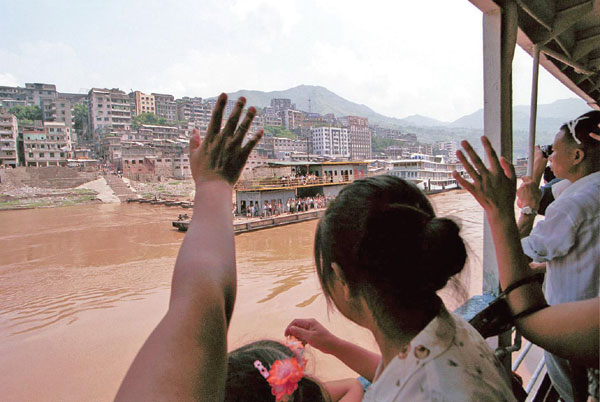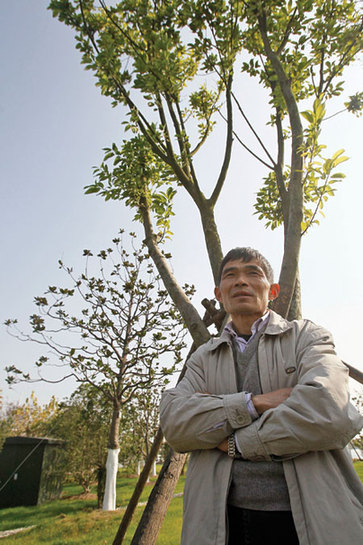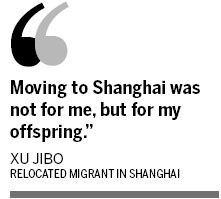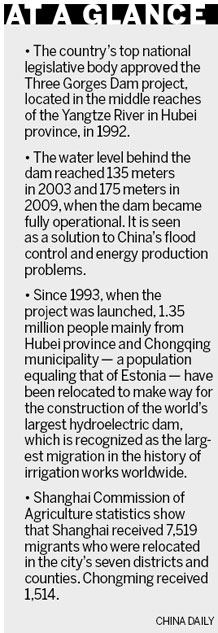Planting roots in Shanghai
Updated: 2011-12-12 10:05
By Qu Yingpu and Xu Xiaomin (China Daily)
|
|||||||||
|
 |
|
Relocated migrants wave goodbye to their hometown of Chongqing on a boat trip to their new homes on Chongming island, in 2000. Zhou Yinjie / For China Daily |
Three Gorges Dam project migrants were advised to 'relocate first, live steadily and then get rich'. And this is what they are doing. Qu Yingpu and Xu Xiaomin report.
Xu Jibo was full of apprehension in 2000 when he was moved from his ancestral home in Chongqing municipality to make way for the huge Three Gorges Dam project. He was 40 at the time.
After a five-day boat trip down the mighty Yangtze River, he and his family arrived at their new home in Chongming, a fertile island that is part of Shanghai municipality.
|
 |
|
Xu Jibo, who was relocated from Chongqing to Chongming, Shanghai, in 2000, stands in front of a huangjiao tree transported from his hometown. Yong Kai / For China Daily |
Since then, Xu and his family have prospered and are now proud of being from Shanghai. Xu doesn't even want his daughters, one of whom is attending university in Sichuan province, to marry "outsiders".
"Moving to Shanghai was not for me, but for my offspring," Xu says.
"If, in the future, they have their families elsewhere than Shanghai, that means my relocation was a failure," Xu says.
"My father said he would accept only Shanghai natives as his sons-in-law before I came to Sichuan for university," says Xu's 19-year-old daughter Xu Shihuan.
After settling in Shanghai for a decade she has a Shanghai accent and says neither she nor her elder sister mind their father's stricture.
New life in Shanghai
Xu's family was among the first batch of 150 families from Yunyang county, Chongqing, to be moved to Shanghai, as part of the relocation project of the Three Gorges Dam (see sidebar).
Before making the decision to move, Xu made a trip to Chongming in early 2000 to see if the island was as good as he had been told.
"I had never been to Shanghai and I thought everything in the city was expensive and Shanghai people would look down on us," he says. But he was pleasantly surprised.
"Villages in Chongming didn't appear to be too different from my hometown" and his soon-to-be new neighbors were down to earth and lived in large but sparsely furnished houses.
 |
After returning to Chongqing, Xu deliberated for a while about the planned move, but he was encouraged to learn Chongming government had offered generous relocation subsidies.
In addition to cash compensation, the local authority gave each family a plot of land and a house. The migrants were entitled to medical insurance and other social services, equal to those provided to Chongming farmers, says Zhang Zhongzhen, deputy head of Chengqiao town, where Xu's family lives.
Xu's mind was made up when it was decided his daughters could study at the best school in town.
In 2008, however, Xu faced change again, as the village he had been relocated to was expropriated for industrial or commercial use. In return, Xu's family was offered two 104-square-meter apartments in the heart of town.
It sounded like a good move, but Xu wasn't entirely convinced.
"Who would be willing to face two relocations? If I gave you two apartments in Shandong province, would you be willing to move there?"
What he misses most, he says, is land to work. "I'm a farmer at heart. I'm still trying to get used to living in a high-rise."
When he was a farmer, he could feed his family with food he grew in the fields, but now he has to "buy everything at the market - and the prices are ridiculous".
"It is 1 yuan (16 US cents) for a small handful of shallots here. How can I spare the money?" he sighs.
Xu has a job at a nearby factory and his wife, Liao Qingnan, works as a cleaner. They rent one apartment and their total income is 30,000 yuan ($4,734) a year.
Since Chongming is positioned as an ecological island with light industry, there are fewer job opportunities compared with other areas in Shanghai.
"In response, the government offers public welfare jobs such as cleaning roads and rivers. Obviously, these jobs don't have a high income," says Zhang, deputy head of Chengqiao town.
Migrants like Xu have been advised to "relocate first, live steadily and then get rich".
"I think it is impossible for me to get rich. But I do believe my daughters will realize this dream in Shanghai," Xu says.
Home where heart is
 |
As for fitting in with Shanghai life and its people, Xu says: "I never felt that I was being looked down upon."
His wife agrees: "I often chat with my neighbors in my spare time and I go to dance classes with them. They are nice to me and my daughters."
The only time that Xu was made to feel like an interloper was in 2004, when he went shopping at a local market, and a vendor called him a "waidiren" (provincial) because he couldn't understand the Shanghai dialect.
"I felt insulted and I showed him my ID card, telling him I was a registered Shanghai resident, just like everyone else."
Having lived in Shanghai for 11 years, Xu confesses he still misses his hometown and maintains his habit of making pickled vegetables and eating chili at each meal.
As a Song Dynasty (960-1279) poem goes: "You live in the upper reaches of the Yangtze River and I live in the lower reaches. Even though we all drink from the Yangtze, I can't see you. I miss you day and night."
"Three years after I moved to Shanghai, my father still sobbed when he talked to me on the phone," Xu recalls, adding his mother is sick and his seven brothers and sisters are still living 2,200 km away in Sichuan province.
For many Chinese, filial piety is one of the principal virtues and as the eldest son, Xu is supposed to live with his parents and take care of them.
Instead, Xu returns to Chongqing once a year to visit his family. He also visits the reservoir at Three Gorges, where his original home is now under water.
"One time, the reservoir was dry and I saw the land where my original home was," Xu says, showing off a picture he took on his mobile phone.
Xu took a huangjiao tree with him when he moved to Chongming 11 years ago, but it died after heavy snow.
The Chongming authority responded by transporting from Chongqing another three trees, in addition to six tons of earth, which were planted in a public park, where gardeners take care of them.
Xu visits the park weekly, smokes under the trees, and rubs their trunks as if they were sacred objects. For him, they are like a symbol of Chongqing, spreading roots and flourishing in Chongming, like the migrants themselves.
"I don't want to stay in my building all day when I get old," he says, adding that he and his wife plan to take regular breaks and live in Chongqing for a couple of months a year.
Xu also hopes that one day his daughters will drive him around Shanghai, after they find good jobs and get married to locals.
"To me, the relocation was a great success."











